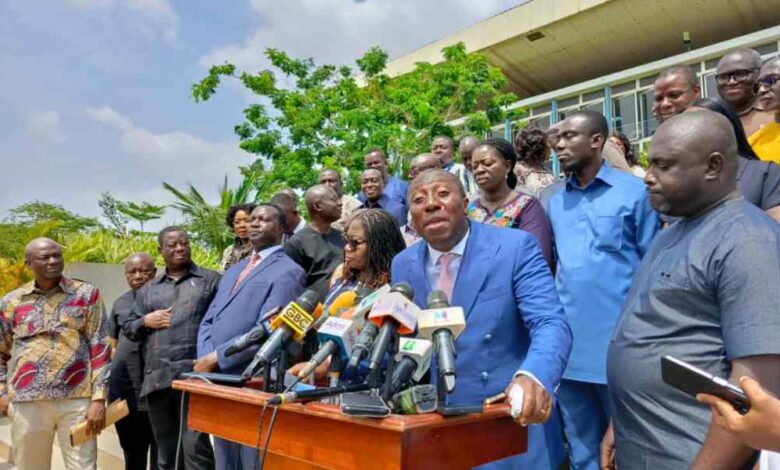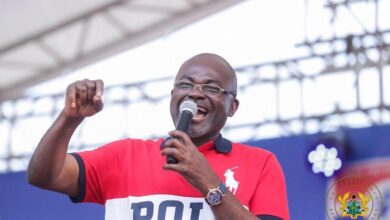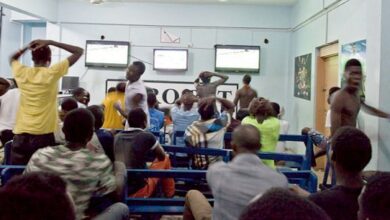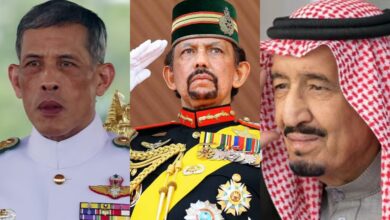Cheating, bullying, and silencing the Minority

These remarks by the Minority Leader, Hon Alexander Afenyo-Markin, bear repeating. In fact, I can think of no better way to begin this piece than by reiterating his words; words that so precisely reflect my own sentiments regarding the recent posture of the Majority Caucus.
“Parliamentary equity is not a favour to the Minority — it is their Rights!
In every functioning democracy, fairness in parliamentary practice is not a matter of convenience—it is a constitutional imperative.
The legitimacy of representation rests not on the brute force of numbers, but on the integrity of the processes through which those numbers are interpreted and applied.
It is not majoritarian muscle that gives Parliament its soul, but the enduring principles of balance, precedent, and the inclusion of minority voices in decision-making.
Parliamentary politics, then, is not merely a numbers game. Yes, numbers matter, but principles matter more. At its core, Parliament is a moral contract: a shared understanding that power must be exercised with restraint, and that electoral victory, no matter how decisive, must never become a license for institutional overreach or unchecked dominance.”
Yet in Ghana’s Ninth Parliament, that contract is being cynically rewritten. The NDC Majority Caucus has abandoned long-standing conventions in favour of partisan convenience, sacrificing fairness on the altar of short-term advantage.
The soul of Ghana’s parliamentary democracy is under siege—not by chaos, but by quiet, calculated erosion.
What happens when numerical strength becomes a weapon, not a mandate? What happens when time-tested formulas, rooted in consensus and fairness, are discarded not in pursuit of reform, but in service of control? What we are witnessing is a deliberate dismantling of parliamentary equity under the weight of majoritarian overreach.
Beneath the surface of ordinary House business lies a coordinated scheme—one aimed not only at depriving the Minority of its rightful representation on parliamentary committees and international delegations like ECOWAS and the Pan-African Parliament, but also at concealing this injustice behind a targeted campaign to tarnish the reputation of the Minority Leader, Hon Alexander Afenyo-Markin, through false narratives and political sleight of hand.
What I therefore seek to do in this piece is to lay out the full facts of this unfolding situation, not with partisan vitriol, but with the clarity of facts, precedent, and logic, so that discerning minds may interrogate the evidence and reach their own conclusions.
What emerges, as you will see, is a disturbing pattern of betrayal, manipulation, and constitutional disregard that appears to be the NDC Majority’s new modus operandi.
For those who value the integrity of our institutions, the question is no longer “What is happening?” but rather: “How far are we willing to let this go?”
The Formula They All Agreed To
Since 1997, Ghana’s Parliament has functioned on the foundational principle of proportional fairness. A settled formula, based on the numerical strength of each caucus, has governed committee representation and delegation appointments. In the current Ninth Parliament, that formula reflects a 68:32 ratio: 68% for the Majority and 32% for the Minority.
This formula has been used to calculate the composition of every committee since the start of this parliamentary term. For example, in a 13-member committee, the calculation yields approximately 8.84 members for the Majority and 4.16 for the Minority.
Naturally, human beings cannot be fractioned, so conventional rounding rules apply: decimals above 0.5 are rounded up; those below are rounded down. These are not partisan decisions. They are mathematical conventions—basic, neutral, and consistently applied across the years. Until now.
It is therefore deeply troubling that the NDC Majority now seeks to undermine this shared understanding, selectively abandoning the formula when it no longer serves their interests. Worse still, they have attempted to twist the facts and mislead the public.
The hypocrisy is glaring. The implications are dangerous. And the truth must be told.
How the NDC Majority Wants to Twist the Math
In a blatant departure from longstanding parliamentary practice and precedent, the NDC Majority has begun to cherry-pick when to apply the agreed formula, conveniently discarding it whenever adherence threatens their partisan control. This breach has been most visible in the composition of delegations to the ECOWAS Parliament and the Pan-African Parliament.
The Case of the ECOWAS Parliament
Ghana’s delegation to the ECOWAS Parliament comprises eight (8) members. By the agreed formula, the allocation should be:
• 68% × 8 = 5.44 for the Majority
• 32% × 8 = 2.56 for the Minority
Following convention, 5.44 is rounded down to 5 membership slots for the Majority, and 2.56 is rounded up to 3 membership slots for the Minority. This arithmetic shows fairness and mutual respect. The math is simple. The principle is clear.
Yet the NDC Majority has skewed these numbers, and introduced a sixth member to their ECOWAS delegation, as an observer. This was a deliberate abuse of their numbers to bully the Minority.
It is worth recalling that this same principle of proportional equity was vigorously upheld by the NDC themselves in the 8th Parliament when they occupied the Minority benches. During the ECOWAS nominations at the time, the calculation clearly showed that the NPP Majority was entitled to 4.44 slots, while the then NDC Minority had 3.56. Instead of exploiting the fractions to their advantage, the NPP Majority side agreed to a fair 4–4 split. Because, the 4.44 was rounded down to 4, while the NDC’s 3.56 was rounded up to 4. The NDC insisted on it. The NPP did not add any other Member as an observer even though they were in the Majority at the time. What has changed? Why is a standard the NDC once fought to protect now being skewed by them? Is it simply because they are now in the Majority?
The Case of the Pan-African Parliament
A similar subversion occurred with the calculation of the membership for the Pan-African Parliament. For the Pan-African Parliament, Ghana’s delegation consists of five (5) members. Again, going by the agreed formula, the allocation should be:
• 68% × 5 = 3.4
• 32% × 5 = 1.6
Following convention, 3.4 is rounded down to 3 membership slots for the Majority, and 1.6 is rounded up to 2 membership slots for the Minority.
Simple. Fair. Non-negotiable.
Yet the Majority sought to claim 4 membership slots for themselves and leave the Minority with only one. After pressure from the Minority Leader, they decided to play the smart card, by passing off an “observer” slot to the Minority as a goodwill gesture—an insult disguised as compromise.
Let us be clear: the formula entitles the Minority to two full members, not one member and one observer. Anything less is theft dressed in diplomacy.
When confronted by the Minority Leadership, the Majority Leadership shrugged off responsibility, saying they deferred the decision to a so-called “political committee” of their party. It must be unequivocally stated that the Majority’s internal congestion is not the Minority’s constitutional debt to pay!
A Trap — And a Leader Under Attack
What followed these representational distortions was a classic misdirection strategy: shift public focus from the real issue — the injustice of skewed representation.
This is where one needs to pay close attention. The decision by the Majority to vary the motion, and remove the Minority Leader’s name from the ECOWAS delegation was a trap. A calculated move to divert attention from their own injustice.
They knew what they had done was wrong, but instead of facing up to it, they tried to confuse the issue and shift the spotlight. This was a cover-up. A desperate attempt to turn the conversation away from their breach of fairness and equity. It was all part of the grand design—to distract, to fracture the Minority Caucus, and to bury the truth under technicalities. To further mask their injustice, a false narrative was carefully fabricared—that the Minority Leader is already part of the IPU and CPA delegations, and that he is monopolising all the opportunities and sidelining his Deputies. A claim that is not just misleading, but entirely untrue.
The attempt to remove him from the ECOWAS delegation and replace him with one his own Deputy was a premeditated ambush. It was a decoy to deflect attention from the Majority’s misconduct and to fracture the cohesion of the Minority front.
One must ask: Why was the Interior Minister Hon Muntaka Mubarak suddenly called to the House to speak on the matter? Why did the Speaker allow the matter to be raised in Afenyo-Markin’s absence?
The answer is simple: it was all a well calculated setup. A coordinated hit. A distraction from the real theft: the theft of representation.
Let us not forget that Hon Afenyo-Markin is not just a Ghanaian MP. He is the Third Deputy Speaker of the ECOWAS Parliament. The scheme to oust him from Ghana’s delegation was driven by more than envy—it was vengeance for his outspokenness in exposing the Majority’s representational violations.
What had been mutually agreed upon in prior Leadership engagements was discarded by the Majority Caucus. And rather than muster the decency to acknowledge the breach and make amends, they opted for calculated deception.
At present, there are several delegations where the NDC side takes as much as seven seats and allocates only one to the NPP Minority. No one knows how these selections are made. There is no transparency. The agreed formula is conveniently abandoned, and delegations are reconstituted at their whim. This is simply not fair.
We must insist on transparency and consistency. The NDC must think deeply about posterity. They must think about tomorrow. Power is never permanent. They may enjoy a numerical advantage today, but what precedent are they setting for the future?They must let principle, not partisanship, guide their actions.
Any discerning mind can read in between the lines and spot this new modus operandi of the Majority Caucus. They will set you up, and then run to the court of public opinion to paint you black. But here’s the truth that pierces through the noise: they have not played fair. Not to the cards, not to the game, not to their side of the bargain. They are simply using their so-called absolute majority to bully their way through Parliament.
And the strategy has been consistent: weaponise their so-called absolute majority to bully the Minority, silence scrutiny, and cover up their misgovernance by denying the Minority the space to interrogate or constructively critique their actions.
Suddenly, every bill is being introduced under a certificate of urgency—a convenient excuse to shut down scrutiny and bulldoze dissent. Take the recent Ghana Medical Trust Fund (Mahama Cares) Bill as an example. No chance to debate. No space to raise questions. It’s either you agree, or you’re drowned out. They did the same with the Goldbod Bill, the Energy sector Recovery Levy (Dumsor Levy) Bill, the UDS Bill—that’s their modus operandi. The Minority cannot speak. They cannot even have the Speaker’s protection.
Then they threaten those who dare to speak up and push back against such oppression. That is why the Minority Leader has not been spared. They have been threatening him just to intimidate him and cower him into silence. But truth doesn’t cower. And truth doesn’t flinch.
This is not parliamentary democracy; this is legislative ambush. It is tyranny masked as majority.
The Speaker’s Complicity and the Death of Parliamentary Fairness
One cannot ignore the silent enabler of this unfolding injustice: the Speaker of Parliament. Constitutionally, Speakers are to be referees, not participants—custodians of balance, not agents of bias. Yet in these critical moments, the Speaker has abandoned neutrality. He presided over these breaches of the agreed formula, sanctioned the lopsided delegations, and went as far as urging the House to vote in support of the motion. This is clear complicity in the erosion of parliamentary fairness and the marginalisation of the Minority.
Anyone who followed proceedings on the 22nd of July 2025, saw the discomfort from some of their own NDC MPs. The wild attacks did not sit well with the reasonable ones among them. Their body language said it all. The silence. The downward glances. Even among the Majority side, it was clear: not everyone was on board with the orchestrated injustice.
But the mischievous ones were determined—to lie, to mislead, and to prop up the ill agenda of the Majority Leader. A man who, by virtue of his position, is supposed to unite Parliament, but instead thrives on division and discord. He has become the chief architect of the Majority’s bully tactics.
And they are getting away with all of this because they have the protection and endorsement of the Speaker. Instead of rising above partisanship to protect the integrity of Parliament, and by extension, defend the rights of the Minority, the Speaker has joined forces with the Majority to bully, to gag, and to bulldoze.
He has become a willing accomplice in this grand scheme of parliamentary injustice. A referee turned player. And history will remember.
Three Heroes in the Eye of the Storm
In the midst of all the political bullying and procedural ambushes by the NDC, three voices have stood out with rare clarity and moral courage — the Deputy Minority Leader, Hon Patricia Appiagyei; the Minority Chief Whip, Hon Frank Annoh-Dompreh; and Hon Patrick Yaw Boamah. It would be remiss of me to share this piece without giving them honorary mention
Hon Patricia Appiagyei
At a time when deception was dressed as consensus and injustice paraded as gender advocacy, she refused to be used as a pawn in the Majority’s agenda to oust her own Leader from the ECOWAS Parliamentary delegation, and she must be commended for it.
Hon Appiagyei showed not only maturity but true, principled leadership. In her memo to the Speaker, she unequivocally declined her nomination to the ECOWAS Parliament, calling out the illegitimacy of the process. Quoting directly from her memo, she wrote:
“At no point have I expressed any intention to replace my Leader, and I am particularly concerned that this development appears to be a calculated effort to cause division between myself and my Leader.”
In a political environment where self-preservation often trumps loyalty, this was a rare act of valour. She not only called out the lack of consultation, but forcefully reminded the House and the Speaker that her Leader’s membership and position as Deputy Speaker of ECOWAS Parliament was both legitimate and legally protected.
As she rightly pointed out: “Hon. Afenyo-Markin was duly sworn in as a Member of the ECOWAS Parliament last year and subsequently elected as a Deputy Speaker. His tenure, by law and by ECOWAS protocol, remains valid and ongoing. There is therefore no legal or procedural justification for his removal…”
Her objection was driven by principle. She refused to be complicit in an act that would compromise the integrity of parliamentary procedure and leadership cohesion. She emphasised in her memo that “..true inclusion must be built on transparent dialogue and not imposed at the expense of established norms or the integrity of leadership structures.”
Indeed, Hon Patricia Appiagyei has proven herself to be not just a committed legislator, but a true mother of Parliament, and of the Minority, standing firm for fairness, unity, and due process when it mattered most.
Hon Frank Annoh-Dompreh
On that fateful day, the Minority Chief Whip showed true leadership by standing firm and doing his best under immense pressure from the Majority front bench. Though the might of the mischievous Majority ultimately overwhelmed his efforts, he showed remarkable courage. He did all he could to defend his Leader, but his lone voice was overpowered. Nonetheless, he must be commended for his resilience.
Again—and permit me to briefly drift from the subject—in the spirit of celebrating his efforts, I wish to also commend him for his instrumental role in mobilising the Minority Caucus to demand accountability from the government.
Notably, on Thursday, 24th July 2025, under his organisational leadership, the Minority Caucus presented a robust petition to President John Mahama, outlining key national concerns—from electoral violence in the Ablekuma North rerun to the worsening galamsey crisis. The petition invoked constitutional provisions and demanded decisive executive action, naming individuals allegedly complicit and calling for independent investigations and sweeping reforms.
This collective action—coordinated under Annoh-Dompreh’s guidance—demonstrates that principled discipline, unity of purpose, and strategic leadership still endure within the Minority. It is precisely this kind of cohesion that reassures the rank and file and blunts the impact of the Majority’s divide-and-conquer tactics.
Hon Patrick Yaw Boamah
Last, but certainly not least, Hon. Patrick Yaw Boamah deserves high praise for his principled stance and refusal to settle for anything less than what is rightfully due him.
In a bold and commendable move, he formally wrote to the Speaker to withdraw from Ghana’s delegation to the Pan-African Parliament—an act that demonstrated both moral clarity and respect for procedure.
He rightly reiterated what I have already elaborated, stating—and I quote:
“Speaker, under the established formula for committees and delegations, my inclusion is by right, as the Minority Caucus is entitled to two representatives. The 68:32 ratio—which guided the allocation of committee membership—supports this.”
In an era where self-interest often overrides institutional integrity, Hon. Boamah’s example stands tall.
If there is any silver lining in this storm, it is that Parliament still has voices like theirs — voices of conscience that remind us that even in the darkest corners of partisan politics, principles can still shine through.
The entire Minority Caucus must take a cue from them. Team above self. Principle over position.
*”Beware, the Ides of March”: A Caution to the NPP Caucus
Let this moment serve as a stern warning to the NPP Caucus: not every offer from the Majority is a gesture of goodwill. Not every colleague is an ally. What happened to your Leader could happen to any of you. When personal ambition blinds loyalty, and silence replaces solidarity, the Minority becomes vulnerable to external infiltration and internal erosion.
And always keep this in mind: the Speaker of Parliament is no neutral person— he is a seasoned divisionist. He will not hesitate to exploit your vulnerabilities, sweet-talk you with feigned affection, and craft the illusion that he loves you more than your own party does. He’ll lure you with privileges — foreign trips, access, attention — and subtly isolate you from your leadership, slowly drawing you into his net. And before you know it, your integrity, objectivity, and loyalty will be compromised.
This is not conjecture. It is a pattern. He did it in the 7th Parliament, luring NPP MPs with feigned affection and enticing offers, ultimately leading some to betray their own and elect him over their party’s chosen candidate Speaker Ocquaye. That single act ushered in four agonising years of gridlock and political trauma in the 8th Parliament. The scars remain. I need not reopen them.
To those MPs who may be desperate, in need of resources or support, I understand you, but be warned. No gift, no envelope, no offer from a Minister or member of the Executive is ever free. These overtures are not acts of generosity; they are bait. What follows is subtle manipulation: leaking your Caucus’ strategy without knowing, undermining your leadership unknowingly, and falling prey to a system designed to capture and control. They will find subtle ways of compromising you, all under the guise of national interest, yet the real aim is to blackmail and control you.
If ever there was a time to heed Shakespeare’s timeless warning in Julius Caesar — “Beware the Ides of March” — it is now. What begins as a gentle political overture may well end in betrayal. Unity is your shield. Without it, you stand exposed.
And finally, to those nursing private ambitions and envisioning their own brand of leadership — be alert. The NDC will flatter you, telling you you’re “better leaders” and “the ones they prefer to work with.” These are not genuine compliments. They are tools of political sabotage. The goal is simple: break your front, exploit your fractures, and weaken your resolve.
So again I say, “Beware, the Ides of March.” You are being watched, studied, and targeted. Do not become a fifth columnist in your own party without even realising it.
The strength of the Caucus is the source of your individual strength. So do not put yourselves first. Do not selfishly place personal interests above those of the Caucus. Put loyalty to the collective above personal ambition. Be united, and let the interest of the Caucus always come first. If you keep that spirit alive, 2028 will not just be another election — it will be your vindication
A Call to Principle
At this crossroads, the Minority must choose principle over convenience. Enough of staying quiet in the face of systemic bullying. Enough of procedural ambushes. Enough of tolerance for representational theft. The time has come to draw a clear red line.
The Minority must boycott any delegation that does not reflect the agreed representation formula. They must demand that all parliamentary delegations be laid before the House and not decided in political backrooms. And above all, they must not allow themselves to be divided from within.
They must rise and, with one united voice, defend their Leader, Osahen Alexander Afenyo-Markin. The Majority’s agenda is strategic. It is carefully designed to fracture the cohesion within the Minority Caucus and to divert attention from their own infractions.
Let every discerning Ghanaian look beyond the surface and see the truth behind the veil. This is not a partisan cry. This is a call for parliamentary justice.
The real danger is not only that the Majority is cheating the Minority. The greater danger is that we may grow accustomed to it. That one day, the betrayal of fairness will no longer stir outrage, but indifference. And that is how democracies die—not with a bang, but with silent, steady erosion such as this.
Let us resist it—while we still can.
Let us not wait until it is too late.
Kwaku Barnes
[email protected]




